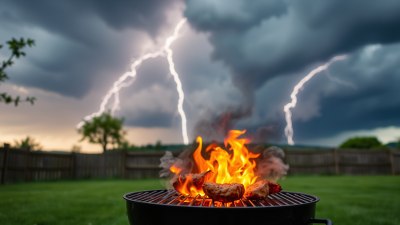Why Cold Weather Feels Colder When You Forget Your Gloves
Discover the science behind why cold weather stings without gloves, and ways to keep warm this winter.

Image by pvproductions on Freepik
As the winter season approaches, many of us prepare for colder weather by equipping ourselves with warm clothing, heavy jackets, and essential accessories like gloves. However, have you ever found yourself stepping outside only to realize you've forgotten your gloves? The bitter cold can suddenly feel much harsher, and there's a scientific explanation for this phenomenon. In this article, we will explore why cold weather feels more intense without gloves, the physiological effects of cold on the human body, and some tips on how to stay warm.
The Importance of Gloves
Gloves play a critical role in regulating our body temperature. When temperatures drop, our body uses various mechanisms to retain heat, including vasoconstriction, which is the narrowing of blood vessels to reduce blood flow to the extremities, thereby conserving warmth. Gloves provide an insulating layer that helps to trap heat close to the skin of the hands, preventing rapid heat loss. Without gloves, our hands lose heat much more quickly, resulting in a sensation of increased cold. This perceived drop in temperature can make even a mild winter day feel frigid.
Physiological Responses to Cold
When exposed to cold temperatures, our body undergoes several physiological changes that can enhance our sensitivity to the cold. Firstly, as our body temperature begins to drop, our skin's receptors become more sensitive to temperature changes. This heightened sensitivity can lead to a greater perception of cold when hands are exposed to the elements without the protection of gloves.
Additionally, unprotected hands become cold very quickly when exposed to frosty air. Cold temperatures cause nerve endings in our skin to send signals to the brain that amplify our feelings of discomfort. Consequently, forgetting your gloves can leave your hands feeling painfully cold in mere minutes.
The Role of Wind Chill
Another factor to consider when discussing the feeling of cold is wind chill. The wind chill index quantifies how cold it feels outside based on the wind speed and air temperature. When it's windy, the body loses heat through convection; cold air whisking past exposed skin enhances heat loss. If you've forgotten your gloves, not only are your hands vulnerable to the already low temperature, but the added wind chill can make the cold feel significantly more severe. This is especially acute on cold, windy days, where the temperature could feel several degrees lower than it actually is.
The Psychological Aspect
Our perception of temperature is not just a physiological response; it is also deeply psychological. When we know we are not properly dressed for the weather, the awareness of this fact can impact how we feel. Receiving cues about coldness from our surroundings can trigger feelings of discomfort even before our bodies react. Forgetting gloves can lead to negative anticipatory feelings about the cold, creating a feedback loop where our anxiety about being cold reaffirms our negative feelings. This can result in our brains perceiving an even greater sense of chill, causing discomfort beyond what the thermometer indicates.
How to Stay Warm Without Gloves
While the best remedy for cold hands is to wear gloves, there are several strategies you can implement to maintain warmth in your extremities even when you go without them. First, keep your hands moving whenever possible. Rhythmically flexing and stretching your fingers can stimulate blood flow and temporarily warm them up. Moreover, keeping your core temperature warm is essential, as a well-heated core can help warm up your extremities too. Layering clothing can also help trap heat and is key in maintaining overall warmth.
If you find yourself without gloves regularly, consider investing in mittens, which tend to retain warmth better since the fingers are together, thereby conserving heat better than gloves, where fingers are separated. Other options include hand warmers or portable heat packs that can be kept in your pockets and used intermittently to provide relief.
The Importance of Staying Dry
Another crucial factor in how cold feels on your skin relates to moisture. Wet hands lose heat much faster than dry hands. If you're caught in wet or snowy conditions, your hands could become cold rapidly. This is why the material of your gloves or mittens is crucial—it should be water-resistant or waterproof to keep your hands dry. Synthetic rain mitts or snow gloves can be useful in these conditions as they prevent moisture from getting in, thus keeping your hands warmer for longer periods.
The Benefits of Proper Hand Care
Don't neglect your hands when it comes to winter care. Applying moisturizers or barrier creams can help with dry skin, which becomes more prone to chapping and discomfort in cold weather. Creating a barrier can help manage moisture levels, helping to keep your skin healthy. Another effective method is using heated gloves, which offer an extra layer of warmth and air circulation, helping to combat the cold and moisture challenges.
Understanding Your Own Tolerance
Everyone has a different threshold for cold, affected by various factors such as age, health, and body composition. Older individuals, for example, often feel cold more intensely due to decreased circulation and thinner skin. It’s important to understand your tolerance level and take appropriate measures to dress warmly based on it. Know your own limits; if you start feeling uncomfortable, it’s essential to seek shelter or warm yourself instead of pushing through the uncomfortable sensation.
Conclusion
In summary, the reason cold weather feels like a bigger challenge when we forget our gloves has to do with physiological cooling mechanisms, wind chill, psychological factors, and personal tolerance levels. By understanding these components, we can better prepare ourselves for facing winter’s chill, even without gloves. Always prioritize your comfort and warmth when going out in the cold, and consider investing in quality winter gear—including gloves—to better enjoy the winter months. After all, staying warm is essential for a comfortable and enjoyable winter experience.











